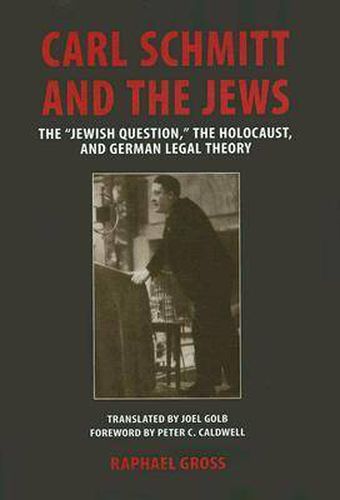Readings Newsletter
Become a Readings Member to make your shopping experience even easier.
Sign in or sign up for free!
You’re not far away from qualifying for FREE standard shipping within Australia
You’ve qualified for FREE standard shipping within Australia
The cart is loading…






This title is printed to order. This book may have been self-published. If so, we cannot guarantee the quality of the content. In the main most books will have gone through the editing process however some may not. We therefore suggest that you be aware of this before ordering this book. If in doubt check either the author or publisher’s details as we are unable to accept any returns unless they are faulty. Please contact us if you have any questions.
German jurist and legal theorist Carl Schmitt (1888-1985) significantly influenced Western political and legal thinking in the last century, yet his life and work have also stirred considerable controversy. While his ideas have been used and diffused by prominent philosophers on both the left and the right, such as Jurgen Habermas and Leo Strauss, his Nazi-era past, especially his active efforts to remove Jewish influence from German law, has cast a cloud over his life and oeuvre. Still, his many supporters have generally been successful in claiming that Schmitt’s was an
antisemitism of opportunity,
a temporary affectation to gain favor with the Nazis. In
Carl Schmitt and the Jews , available in English for the first time, historian Raphael Gross vigorously repudiates this
opportunism thesis.
Through a reading of Schmitt’s corpus, some of which became available only after his death, Gross highlights the importance of the
Jewish Question
on the breadth of Schmitt’s work. According to Gross, Schmitt’s antisemitism was at the core of his work - before, during, and after the Nazi era. His influential polarities of
friend and foe,
law and nomos,
behemoth and Leviathan,
and
ketechon and Antichrist
emerge from a conceptual template in which
the Jew
is defined as adversary, undermining the Christian order with secularization. The presence of this template at the heart of Schmitt’s work, Gross contends, calls for a major reassessment of Schmitt’s role within contemporary cultural and legal theory.
$9.00 standard shipping within Australia
FREE standard shipping within Australia for orders over $100.00
Express & International shipping calculated at checkout
This title is printed to order. This book may have been self-published. If so, we cannot guarantee the quality of the content. In the main most books will have gone through the editing process however some may not. We therefore suggest that you be aware of this before ordering this book. If in doubt check either the author or publisher’s details as we are unable to accept any returns unless they are faulty. Please contact us if you have any questions.
German jurist and legal theorist Carl Schmitt (1888-1985) significantly influenced Western political and legal thinking in the last century, yet his life and work have also stirred considerable controversy. While his ideas have been used and diffused by prominent philosophers on both the left and the right, such as Jurgen Habermas and Leo Strauss, his Nazi-era past, especially his active efforts to remove Jewish influence from German law, has cast a cloud over his life and oeuvre. Still, his many supporters have generally been successful in claiming that Schmitt’s was an
antisemitism of opportunity,
a temporary affectation to gain favor with the Nazis. In
Carl Schmitt and the Jews , available in English for the first time, historian Raphael Gross vigorously repudiates this
opportunism thesis.
Through a reading of Schmitt’s corpus, some of which became available only after his death, Gross highlights the importance of the
Jewish Question
on the breadth of Schmitt’s work. According to Gross, Schmitt’s antisemitism was at the core of his work - before, during, and after the Nazi era. His influential polarities of
friend and foe,
law and nomos,
behemoth and Leviathan,
and
ketechon and Antichrist
emerge from a conceptual template in which
the Jew
is defined as adversary, undermining the Christian order with secularization. The presence of this template at the heart of Schmitt’s work, Gross contends, calls for a major reassessment of Schmitt’s role within contemporary cultural and legal theory.